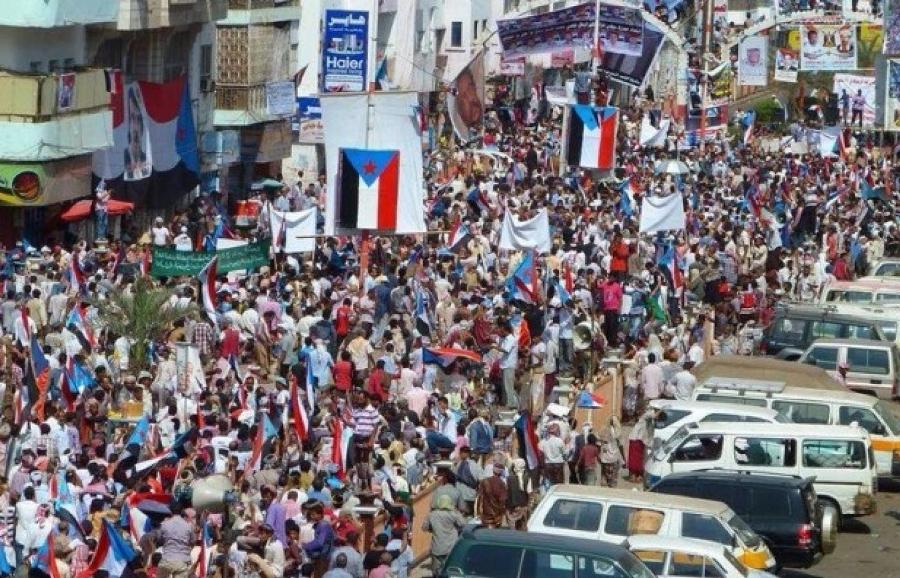AhlulBayt News Agency (ABNA): The start of a new round of widespread popular protests in the southern provinces of Yemen in recent days against the poor economic and living conditions, the lack of social services and welfare, as well as the presence of foreign occupiers is presenting a new trouble for the Arab-Western alliance represented by Saudi Arabia.
Protests erupted following a crackdown of the Southern Transitional Council (STC) militants on the demonstrators that led to death of a young man, forcing STC head Aidarus al-Zubaidi to declare state of emergency in southern provinces.
Following the declaration, the protest leaders issued a statement, insisting on advancing with the demonstration until the main goal is realized, i.e. the expulsion of Saudi and Emirati forces from the south. Declaring that the people are the source of legitimacy and that no party, whether the STC or Hadi government, has the right to impose itself as the ruler and guardian of the people, they blamed the Saudi-Emirati coalition for the current disarray and attacks on the peaceful protests.
The protest movement also called for civil disobedience and asked what it called "southern resistance and army and security members" to join the popular uprising.
Arab coalition terrified of south's popular uprising
Amid unfolding protests at deteriorating living and even security conditions, the aggression countries and their Western supporters, concerned about broader protests, blamed Sana'a for what they called a rebellion. Al-Hadath, a sister network to Saudi-run Al-Arabiya news network, claimed arresting cells affiliated with Ansarullah, citing Hadi government sources. The same propaganda trick was already applied in Ma'rib, where a fierce war was underway between Saudi-backed proxies and Ansarullah forces.
The statement by Saudi Arabia, the UAE, the US, and Britain clearly shows the degree of their fear of these protests, which may lead to the loss of control of the south and the consequent loss of their instruments, namely transitional government, which facilitate their illegal intervention in Yemen.
After media propaganda, next move was their massive campaign to arrest the protest leaders in Aden, Shabwa, and Hadhrahmaut. In recent days, the crackdown targeted the so-called "cells" working for Sana'a.
The Arab coalition in next days will possibly facilitate return of the exiled officials to inject calm into the streets of Aden and other southern cities. Reports said exiled Aden and Abyan governors have flew back to Aden from Cairo, Egypt.
Under UAE pressure, the STC may allow more officials to return to Aden to reduce the gap in Aden's so-called transitional government and make people optimistic about future economic and security conditions. But even this measure does not clear prospects for revival of the Riyadh agreement, signed between Hadi and STC in 2019. While the Islah Party insists on returning to Aden for its officials to play more effective roles, the STC does not implement the agreement terms, including existing from Aden and handing over the city to Hadi government. So, the show of return of Hadi officials to Aden is not more effective than return of a presidential guard unit, meaning crisis will continue between the two sides.
More protests to come as crisis continues
Even with slim assumption of Saudi-Emirati agreement on Hadi cabinet return to Aden, observers hold that these show moves do not help calm the protests since downturn of public discontentment is tied to solving the economic problems. With the problems keep accumulating amid rife corruption among officials, there is no promise of a solution.
The STC and Hadi pledge putting aside the differences while a year has gone since new cabinet held the power. During the year, not only the division remained in place but also living conditions worsened and national currency rial lost nearly 30 percent of its value against the US dollar, and this loss could reach 50 percent as economists warn. This economic predicament in the southern provinces comes while the heavily-sanctioned Sana'a and other northern provinces have maintained the currency value despite all-out blockade. In the south, a dollar now equals 1,100 rials and could rise to 1,500, up from 700 rials. In the north, every dollar is dealt about 600 rials.
Meanwhile, southern public anger with foreign dominance of the affairs of the south makes more protests likely and erodes Hadi and STC legitimacy, as natural resources are looted and ports and islands are seized for transformation into colonies.
/129

